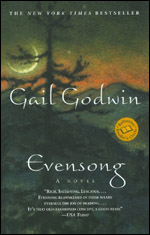 (Reprinted with permission from Sojourners magazine, written by Jo Ann Heydron.)
(Reprinted with permission from Sojourners magazine, written by Jo Ann Heydron.)
In the subject of vocation, French philosopher Simone Weil wrote that “the most beautiful life” is one “where everything is determined . . . where there is never any room for choice.” This account of commitment to faith communities questions whether Weil was right. Should obedience to a calling leave room for choice?
One might wish that Margaret Bonner, the heroine of Gail Godwin’s novel Evensong listened to more voices. Godwin’s readers will remember Margaret from the 1991 novel Father Melancholy’s Daughter, in which she was the only child of a dedicated but often depressed Episcopal priest whose young wife had left the family. In this new novel, Margaret has nearly duplicated her mother’s life, having married a priest twenty years older and also given to black moods.
An important difference is that Margaret herself is a priest. She is called, however, to serve an upscale parish very like her father’s in High Balsam, a resort town in the Smoky Mountains where business closings have left the year-round population divided and hostile.
The book’s action, itself a kind of evensong for the millennium, takes place during the Advent season of 1999 and centers around a millennial march intended to rededicate High Balsam and its people to Jesus. Margaret fears that the march will lead the unemployed to expect instant relief and is determined that her church will not participate. She is also exasperated by the march’s manipulative fundamentalist organizer. Meanwhile, Margaret and her husband, headmaster at a local school for troubled boys, must sort out the effects on their already shaky marriage of two difficult, long-term houseguests.
Godwin presents her characters to us in much the same way as Margaret strives to practice intercessory prayer, by simply bringing the image of the loved one into God’s presence. We see the characters from all sides, through virtually no authorial filter of judgment. It is nevertheless the author herself who limits the voices audible to Margaret.
I wish that Godwin had given us the voices of the poorer citizens of High Balsam. The only displaced worker we meet wins lifetime employment through an act of individual heroism, during the novel’s eventful denouement. By sending Margaret to a church like her father’s and in other ways restricting Margaret’s ability to make genuine choices about whom and how she serves, Godwin drives this reader to conclude that Weil was wrong. God calls us to not only choose obedience but to keep our hearts and minds open to the many voices, authoritative or timid, experienced or fresh, angry or kind, in which God’s truth is spoken.